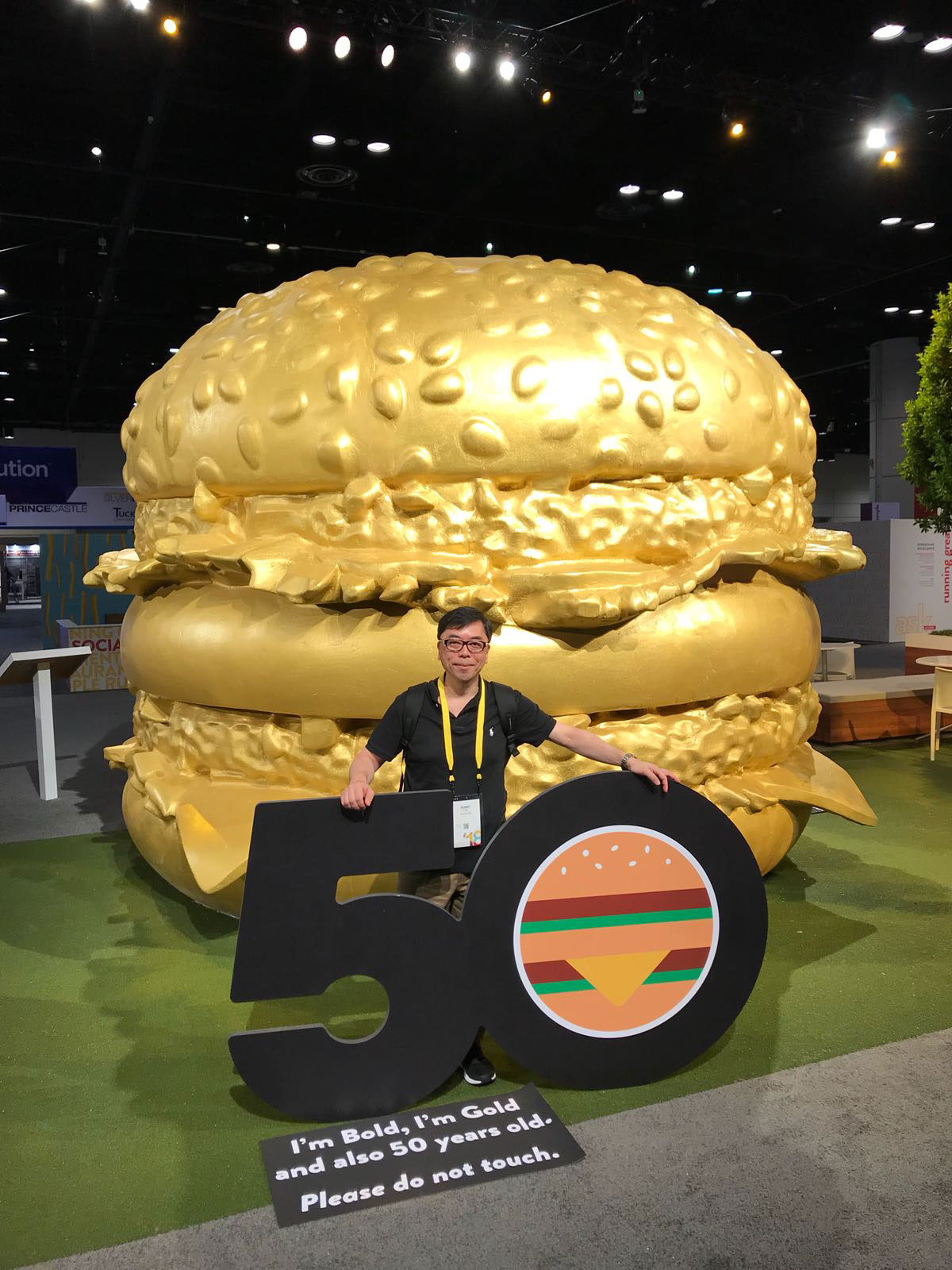Why did you choose to work in
HR?
I studied BBA at the Chinese
University of Hong Kong. Back then
in the late 1980s, you had to choose
either General Business Management
or Human Resources. I chose HR for
two main reasons: at that time there
was a transformation in
organisations, and HR was moving
from an administrative function
– often called Personnel – to more
of a strategic function, so I saw a lot
of opportunities there for well-trained
HR professionals. Secondly,
one nice thing about HR is that
there are different functional areas
or disciplines. There’s the human
side, such as interviewing people,
developing talents, and change, and
there are some unique skills needed
there. And then there’s reward
management, or remuneration, a
field requiring a more analytical
capability. So, I was attracted to this
diversity of functions within the field
of HR.
Where did you begin your
career?
I started out as an HR management
trainee with the MTR (Mass Transit
Railway). This is a big company and
there was good job rotation with the
opportunity to work in several
different functions such as
remuneration, employee relations,
HR account services serving different
departments, so I got the chance to
build a solid foundation. After that I
wanted to gain international
exposure, so I joined Motorola, who
at that time had a big manufacturing
facility in Hong Kong.
I worked in a few other
multinationals after Motorola. Then
in the mid-2000s, I took a career
break to pursue another career
aspiration. I spent 18 months as an
Assistant Professor at the Hong
Kong Baptist University. I really
enjoyed teaching, interacting with
the students, and sharing my
experience.
I joined McDonald's in 2007, with a
new position especially created in
reward management, which is to a
certain extent my area of expertise.
It was a new industry experience, in
a company strong on employee
engagement and branding, so that’s
why I came here.
You mentioned reward
management?
Yes, some companies call it
compensation and benefits or
remuneration. It is more around
how you decide your grading
structure, bonus schemes, benefit
plans, all kind of programmes both
tangible and intangible (for
example, recognition schemes).
How to motivate and engage your
employees? How to recognise your
best restaurant managers?
Could you describe McDonald's
management structure?
We have gone through a major
transformation since 2015. Before
that we had a typical multinational
structure with specific regionally
based organisations covering areas
such as the US, Europe, Latin
America, Asia Pacific, etc. Since
2015 we decided to revamp the
structure to align with our business strategy. We have the US segment,
which is huge with over 14,000
restaurants. And we grouped all the
markets wholly owned by
McDonald's (e.g., Germany,
Australia and Canada) in the
International Operated Markets
(IOM) segment. And then we have
80+ markets in one big International
Developmental Licensed Markets
(IDLM) segment. These are a little
bit like franchises, the difference
being that these markets are run by
a big local business partner.
What are the advantages of the
Developmental Licensee
strategy?
Approximately 93% of McDonald’s
restaurants worldwide are now
owned and operated by
independent local business owners.
DL is a key driver for growth and
helps us to understand individual
customer needs and local customer
preferences, to penetrate the local
market more readily, and to grow
fast. We still have a core business
unit team for each region, but the
management hierarchy is pretty flat
in order to be close to customers.
How about the training
function?
We are very proud of the way that
we develop our people. At
restaurant level we hire a lot of part-time
employees. Some of them
joined us as high school students,
and may decide that they will not
go to university because they want
to develop their career in our
industry. So, we need to equip them
with the necessary operational and also managerial skills. We call our
learning development function for
restaurant operations "The
Hamburger University," and we
have physical facilities in quite a lot
of countries. But more importantly
we have very rigorous training
curriculum for employees at
different levels in the restaurant. To
become a restaurant general
manager, for instance, you will need
to go through specific modules. If
you want to be promoted to the
next level, which we call operation
consultant where you manage
perhaps seven or eight restaurants,
that’s a different skill set, and we
also provide specific training
programme. That's critical. Equally
important is equipping people with
the necessary leadership
development and exposure to new
experience.
How do you handle innovation?
Innovation is key, and it is critical to
innovate to meet customer needs.
Back in 2013–14 we encountered
quite a lot of challenges. So we
asked ourselves, how can we
elevate ourselves? While we will
continue to run great restaurants
and offer value to customers, the
importance of customer obsession
came in. We have to understand
our customer needs. For instance,
as always, we endeavour to
innovate our menu and would do
testing before launching new items.
But to ensure customer obsession,
we ensure we will collect enough
insights from our customers. We
now emphasise more on the
importance of customer validation
to back up innovations, and that’s how we respond to customer needs
nowadays.
How is McDonald's adapting to
preferences for a plant-based
diet?
McDonald's already offers meatless
burger in some countries, such as
India, South Africa and Australia.
In Canada we have tested a new
product which is a plant-based
burger, under the P.L.T. (Plant,
Lettuce, Tomato) trial, and we are
evaluating learnings from our recent
test to inform future menu options.
How about regional diversity?
If we take menu items as an
example, of course we have many
iconic products like Big Mac or
Filet-O-Fish and fries, which are core
menu items and popular in almost
all the markets that we operate. But
at the same time, we need to cater
for local market differences. A
classic example is India. We do not serve beef and pork in India, and
there is a big vegetarian population.
So, we introduced tasty vegetarian
burgers. In Hong Kong we have
been launching twisty pasta, which
is well loved by local customers for
breakfast. Many Asian customers
love durian, and so we launched
durian McFlurry in Malaysia and
Singapore, and customers are crazy
about it.
How about the role of
technology?
We introduced our Velocity Growth
Plan in 2017 and identified three
pillars of the growth strategy. We
needed to retain existing customers;
regain customers we have lost; and
convert casual customers to
committed customers. In order to
support this effort, we identified
digital as one of our key accelerators
and are committed to re-shape our
interactions with the customer
– whether they eat in, take out,
drive thru or order delivery.
For instance, we have been
introducing new digital elements in
our stores, including digital menu
boards, self-ordering kiosks, and
mobile ordering. At the end of the
day, we want to deliver our brand
promise of "making delicious feel
good moments easy for everyone."
Will management need to
develop a new skill set to
leverage technology
effectively?
Technology has been changing
constantly over the past few
decades. I think the key is that our
people have a mindset which is
open to change. That is critical and
applies to everyone, not just the
colleagues in the technology
function. Take an example, in HR we
need to ask ourselves how can we
use tech to attract applicants? Then
how can we use tech to help
interview candidates? In Australia
for instance we have taken to use
Snapchat to attract candidates,
which gave them a job search
experience that resonated with
them.
How well is change managed in
universities?
I do see a lot of changes in recent
years, especially in connecting with
the business world. CityU is a good
example, we have departmental
advisory committees where the
corporate world is well represented.
From the student side, there are more
and more opportunities to understand
the business world through
internships. Another change is
mentoring, that’s a great idea to
provide students with exposure to the outside world. Nowadays we talk
about reciprocal mentoring. We need
to learn from one another. That way
we can work across the so-called
generation gaps.
How do you see employment
opportunities changing for our
Management graduates?
This is a timely question, especially
because of Covid-19. I would say it
is still uncertain at the moment, as it
will take quite some time to
understand the short- and long-term
impact of Covid-19. We talked
about tech, and there are always
growth areas. Right now, all
companies are talking about digital,
AI, and cyber security. Perhaps
management graduates need to ask
themselves, "how can I upgrade my
knowledge in say digital marketing,
big data and cyber security, so that I
can differentiate myself from the
crowd?"
Can the food retail business
overcome Covid-19?
Obviously, currently sales in the
industry are down in most
countries, but at the same time
we can ask ourselves what can we
do to mitigate the risk? How can
we leverage more from, say,
delivery? Can we make delivery
contactless? We need to try and
anticipate the trends post
Covid-19. We need to monitor
and check whether this is going to
be short- or long-term? On the
people side, through this whole
episode, we need to keep asking
how we can engage with our
people. How can we stay
connected with them, and make sure they understand what has
happened? How can we assure
employees that it is now very safe
to come back to work in the
restaurants?
What about sustainability?
As one of the world’s largest
restaurant companies, we have the
responsibility and opportunity to
take action on some of the most
pressing social and environmental
challenges in the world today. The
size and reach of our business put
us in a unique position to improve
people’s lives and the environment.
We want to use our global scale
and continue raising the bar on
what it means to be a responsible
company committed to people and
the planet.
Our current "Scale for Good"
priorities cover Climate Action, Beef
Sustainability, and Packaging &
Re-cycling, and Family Commitment.
Another element of sustainability is
people. How can McDonald's
provide youth opportunities to train
young people the skills that they
can use in their future lives?


